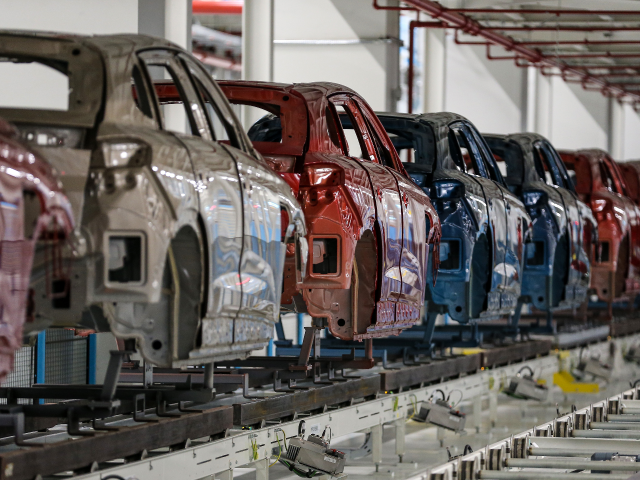The Business and Human Rights Resource Center (BHRRC), a human rights advocacy group based in London with an international research team, published a report last week that warned of human rights violations and environmental damage in the supply chain for electric vehicle (EV) batteries.
The report, entitled “Powering Electric Vehicles: Human Rights and Environmental Abuses in Southeast Asia’s Nickel Supply Chains,” endorsed the “shift towards carbon-neutral economies” that could be aided by electric vehicles but warned about “endemic human rights issues relating to the components needed for renewable energy products.”
BHRRC focused on nickel, a vital mineral for battery production that flows through particularly opaque and troubling supply chains.
“Without supply chain transparency, battery manufacturers, end-user companies and investors appear distanced from the abuses lower down the value chain and can get away with not addressing these risks,” the report said, skirting delicately past the possibility that EV manufacturers in the Western world want to be distanced from the abusive practices employed to provide them with components at manageable prices.
BHRRC focused on a Philippine company called the Rio Tuba Nickel Mining Corporation and two Chinese firms in Indonesia, Zhejiang Huayou Cobalt (ZHC) and CNGR Advanced Materials. The report accused Rio Tuba of contaminating water with its nickel mining activities, destroying rainforests, exploiting local residents and indigenous communities, and creating food insecurity by eliminating farmland.
The alleged water contamination involved hexavalent chromium, a cancer-causing agent. People living around the mine have reported an “uptick in coughs and other respiratory issues, as well as skin lesions.”
BHRRC’s report said there is evidence that local landowners and tribal residents were misled when their consent for the mine was obtained, and tribal leaders now oppose expanding Rio Tuba’s operations any further.
The Chinese mining operations in Indonesia were also cited for causing respiratory problems in local residents and damaging rice fields with water pollution. Local fishermen said their fishing grounds had been ruined by discharges of hot and toxic wastewater.
Indonesia and the Philippines are currently the number one and two producers of nickel worldwide, with the Philippines running a rather distant second to Indonesia’s immense production. BHRRC counted Ford and Tesla among the top customers for Indonesian nickel.
“If Elon Musk believes nickel extraction is eco-friendly, that’s untrue,” Melky Nahar of the Mining Advocacy Network told Radio Free Asia (RFA) through an affiliated news organization on Tuesday, referring to the CEO of Tesla.
“The human rights abuses in electric vehicle supply chains need to be urgently interrogated and mitigated… and supply chain transparency and accountability must be at the heart of this,” BHRRC Southeast Asia researcher Pochoy Labog told RFA.
“The positive momentum towards electric vehicles risks being derailed by these unaddressed abuses,” Labog said.
“While this shift to greener sources of energy must be encouraged, now is the time to start asking serious questions about the human rights abuses in electric vehicle supply chains,” he urged.
Human rights and environmental advocates who are ideologically sympathetic to the EV industry are having difficulty wrestling with how endemically, and perhaps inescapably, abusive and dirty those supply chains are. The evidence is piling up that EV manufacturing is heavily reliant on low-cost materials produced by China and other human-rights offenders who cut costs by treating workers poorly and running mining operations that would never pass muster with Western environmental agencies.
EVs are already far more expensive (and far less popular) than internal combustion engine (ICE) vehicles, and without those cheap materials flowing through sketchy supply chains, the costs would soar even higher. More transparent and rights-conscious countries would have to invest large amounts of time and money in developing their mineral extraction and processing industries to compete with the China-dominated rare earths industry — and even if they made those investments, meeting the growing demands of the EV industry may not be possible without buying materials from abusive suppliers.
Harvard professor Siddharth Kara caused a sensation late last year with the publication of his book Cobalt Red: How the Blood of the Congo Powers Our Lives and a supporting interview with podcast superstar Joe Rogan. Kara warned the battery industry’s ravenous appetite for cobalt was supporting a regime of “slavery,” including child labor, that was inflicting “more suffering” on exploited people than any previous slave regime in the world.
Kara scoffed at the notion of “clean cobalt” and said the industry could not afford to stop doing business with environmental abusers and human rights offenders. The BHRRC report offers further evidence that the electric vehicle “transition” is not a gentle one.

COMMENTS
Please let us know if you're having issues with commenting.